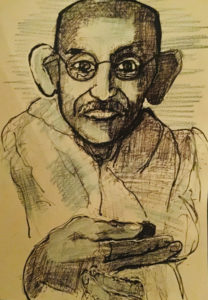Mohandas Gandhi was an Indian activist who was the leader of the Indian independence movement against British colonial rule. Employing nonviolent civil disobedience, Gandhi led India to independence and inspired movements for civil rights and freedom across the world. However, the person he became had much to do with his life as a lawyer.
Gandhi sailed for England on 4th September, 1888 to study law and become a barrister. He was called to the Bar on 10th June, 1891 and was enrolled in the High Court of England the next day. A day later, he sailed home. After his return to India he started practice as a lawyer in the High Court at Bombay but did not make much headway in the profession. It was only when the hand of destiny guided his steps to South Africa that he soon made his mark there as a lawyer and as a public worker. The valuable experience and skill that he acquired in the course of his large and lucrative practice stood him in good stead in fighting his battles with the South African and British governments for securing political, economic and social justice for his fellow-countrymen.
Gandhi realized early in his career the paramount importance of facts. As he observes in his autobiography “facts mean truth and once we adhere to truth, the law comes to our aid naturally”. Facts according to Gandhi constituted three-fourths of the law and if we took care of the facts of a case the law would take care of itself.
If there was one characteristic more than another that stamped Gandhi as a man, it was his extraordinary love of truth. Truth, like nonviolence, was the first article of his faith and the last article of his creed. It was therefore no wonder that in his practice of the law, he maintained the highest traditions of the profession and did not swerve from the path of rectitude and integrity.
He never forgot “that if he was the advocate of an individual, and retained and remunerated, often inadequately, for his valuable services, yet he had a prior and perpetual retainer on behalf of truth and justice.” He practiced law without compromising truth. As he observes,
My principle was put to the test many a time in South Africa. Often I knew that my opponents had tutored their witnesses, and if I only encouraged my client or his witnesses to lie, we could win the case. But I always resisted the temptation…. In my heart of hearts I always wished that I should win only if my client’s case was right…. I warned every new client at the outset that he should not expect me to take up a false case or to coach the witnesses, with the result that I built up such a reputation that no false cases used to come to me. Indeed some of my clients would keep their clean cases for me, and take the doubtful ones elsewhere.
In 1910, Gandhi abandoned the practice of law and devoted his entire time and energy to the service of the community. Thereafter, in the remaining years of his life, whether in South Africa or in India, Gandhi was often engaged in breaking laws, rather than interpreting them in the courts. After his imprisonment in 1922, during his first civil disobedience movement in India, he was disbarred by his Inn. He would not apply for reinstatement. However, the Inner Temple which disbarred him has since restored his name to the roles and honored his memory. In 1984, his special portrait was unveiled in the library. Furthermore, Gandhi’s bust now adorns the coffee room of the Inner Temple and his statue has been installed in its lawns.
Much can be learned by a deep reflection upon Mahatma Gandhi’s practice of life and law.1
1 Quotes from this piece have been taken from: M K. Gandhi, An Autobiography, DeLuxe Edition Vol. I (1968), Furthermore, much of the content has been taken from https://www.mkgandhi.org/law_lawyers/chapters1.htm.


